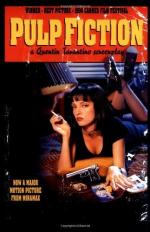|
This section contains 943 words (approx. 4 pages at 300 words per page) |

|
SOURCE: "Minor Magic," in Artforum, Vol. 33, No. 7, March, 1995, pp. 63-6, 110.
In the following essay, Cooper discusses the appeal of Tarantino's dialogue and cinematic presentation.
There should be a dozen youngish American filmmakers as inspired as Quentin Tarantino. Then it would be easier to designate him a quirkily brilliant minor director, which is what he is. But even with his rather glaring limitations—stagey archetypal characters, short- and long-term memory problems, a lazy visual sense—there's so much finely tuned energy in his films compared to most of his contemporaries. Tarantino really is one of the few post-Martin Scorsese directors capable of bona fide cinematic magic. He isn't in a class with, say, serioso experimentalists like Jon Jost and James Benning, but, like them, he is fascinated by Scorsese and his obsessions (the intricacies of male angst). Scorsese is deep, and his best films are girded with emotional and...
|
This section contains 943 words (approx. 4 pages at 300 words per page) |

|


